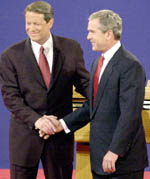At Law School, Ralph Nader gets a chance to speak his mind… and more
Introduced by economist and Women’s Studies director Juliet Schor, Nader strode to the podium amid thunderous applause from the largely student audience, their enthusiasm stirred perhaps by the knowledge that they alone would be the recipients of Nader’s message.
Nader and other third party candidates had been ruled ineligible to participate in the night’s televised debate between Al Gore and George W. Bush, held at UMass-Boston. As it turned out, Nader was not even permitted to join the audience.
At a press conference before his talk, Nader introduced Northeastern student Todd Tavares, who held up a ticket to the debate and announced that he was giving it to Nader. “It’s a small sacrifice for the good of the nation,” he said.

According to later news reports, however, the ticket did Nader no good. He was turned away at the door and told that he “had not been invited.”
In his talk, Nader criticized the federal government and other institutions, including Harvard, for failing to extend the benefits of a rising economy to those at the bottom of the economic ladder. He said that minimum wage earners today are making $2.15 less, adjusted for inflation, than they were making in 1968, and that low-income Americans are going into debt to make ends meet. Only the well-to-do are benefiting from the current boom.
“They used to say that a rising economy lifts all boats. Now a rising economy lifts all yachts.”
Nader decried the growing corporate influence pervading all aspects of American society, accusing politicians of using corporate funds to get themselves reelected, then handing the government over to the corporations that paid for their campaigns.
Holding up a recent issue of Business Week whose cover asked, “Too Much Corporate Power?”, Nader quoted the magazine as saying that corporations should get out of politics.
“This means that Business Week is more progressive than the Democratic Party,” he said.
Unlike the two major parties, which are largely ignoring pressing issues like affordable housing, public transportation, the environment, and the quality of education, the Green Party offers “a broad and deep agenda,” and is steadily building influence, Nader said.
“The two major parties are fossil parties,” he said. “They don’t have deep roots. They’re like a tree that’s decayed from the inside and is waiting for lightning to strike.”Nader accused his alma mater, Harvard Law School, of being “marinated in corporate money,” and asked why the School did not use some of its endowment to establish more centers for law and justice.
He challenged the students to help with the slow and difficult work of building a viable third party and warned them of the dangers of complacency.
“Coming out of Harvard Law School, you can get on an escalator and just keep going up. At every stage, all you have to say is ‘Harvard Law School’ and just keep rising to the next level. But do you realize how that weakens and debilitates you?”
He cautioned the students that they were heading into “the contented classes,” where they will be able to avoid all the problems that arise in our society.
“If the water is undrinkable, you’ll be able to drink bottled water. If the schools are bad, you’ll send your children to private schools. If the roads get too congested, maybe we’ll develop little private helicopters. But when these problems become global, you won’t be able to ignore them anymore.”
The answer, Nader said, is to build a third party dedicated to “deconcentrating” power and returning it to the people.
“We are building for the future, and we’d like you to be with us,” he said.
The event was sponsored by the Progressive Student Labor Movement and the Institute of Politics.




